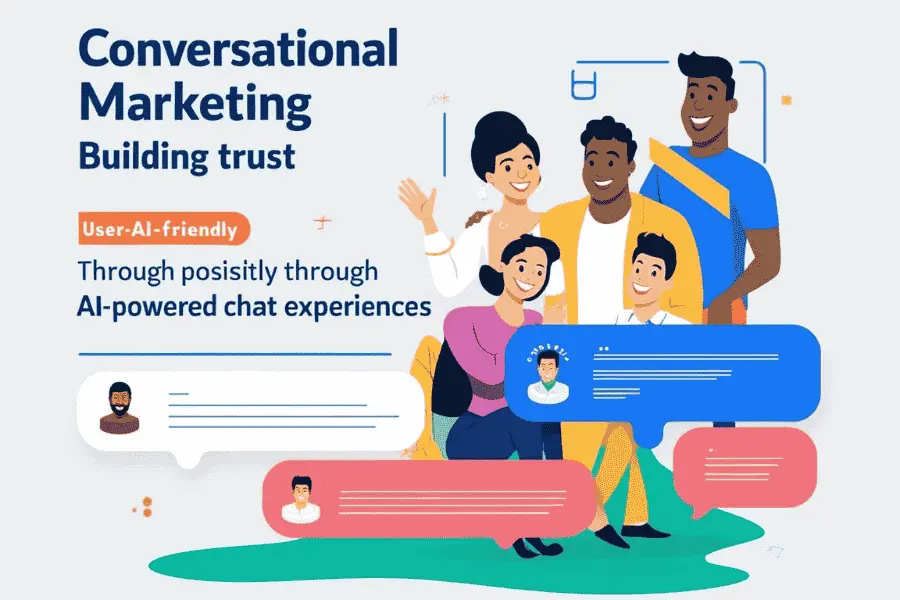Conversational Marketing and Building Trust with AI-Powered Chat Experiences
Introduction: The Rise of Conversational Marketing
Conversational marketing has rapidly become a cornerstone of digital engagement strategies. With consumers demanding instant, personalized interactions, brands are leveraging AI-powered chat experiences to build trust, capture leads, and drive conversions. Unlike traditional static forms and delayed email responses, conversational marketing creates real-time, human-like communication channels that enhance user satisfaction and retention.

What Is Conversational Marketing?
Conversational marketing is a strategy that uses real-time, two-way conversations—typically through chatbots, messaging apps, or voice assistants—to engage with users. It’s designed to simulate natural dialogue, guiding users through the buyer journey in an intuitive, frictionless manner. This method focuses on listening to users, understanding their intent, and responding with relevance, often with the help of automation and AI.
The Role of AI in Enhancing Chat Experiences
AI-powered chatbots are central to conversational marketing. These bots use natural language processing (NLP), machine learning, and data analytics to understand user inputs and respond appropriately. They can remember past interactions, tailor messaging based on user behavior, and even escalate complex queries to human agents when necessary. The goal is not just to answer questions, but to make users feel understood and valued.
Building Trust Through Personalization and Transparency
Trust is built when conversations feel authentic and personalized. AI chatbots achieve this by referencing previous interactions, tailoring product recommendations, and using the customer’s name or preferences in dialogue. Transparency is also key—users should know they’re speaking to a bot, understand how their data is being used, and be given the option to speak with a human when needed.
From Lead Qualification to Conversion
AI-driven conversational tools can do more than answer FAQs—they can qualify leads, book meetings, and guide users to the next step in the funnel. For example, an AI chatbot on a product page can engage visitors by asking what they’re looking for, recommend options, and even offer limited-time discounts. This real-time engagement increases the likelihood of conversion while collecting valuable customer data.
Omnichannel Chat Strategies for Seamless Experiences
Effective conversational marketing happens wherever your customers are—on your website, social media, WhatsApp, SMS, or voice-enabled platforms. Integrating AI chat across these channels ensures a seamless and consistent brand experience. Customers can start a conversation on one platform and pick it up on another without losing context, making interactions more fluid and satisfying.
Measuring Success and Optimizing Chat Interactions
To optimize conversational marketing, it’s essential to track key performance indicators (KPIs) such as engagement rate, resolution time, satisfaction score (CSAT), and conversion rate. AI analytics can identify patterns and pain points in chat flows, allowing marketers to refine scripts, improve decision trees, and deliver more impactful conversations.
Conclusion: Earning Loyalty Through Intelligent Dialogue
Conversational marketing powered by AI is not just a trend—it’s a paradigm shift in how brands build relationships. By delivering relevant, real-time conversations that feel personal and helpful, businesses can foster trust, guide customers seamlessly, and build long-term loyalty. In a world that values connection and speed, the brands that master conversational AI will lead the way.
Active Events
From Insights to Impact: Proven B2B Marketing Strategies for Scalable Success
Date: Aug 08, 2025 | 7:00 PM(IST)
7:00 PM(IST) - 8:10 PM(IST)
2811 people have registered
Your Data Science Career Game-Changing in 2024: Explore Trends and Opportunities
Date: Aug 08, 2025 | 7:00 PM (IST)
7:00 PM (IST) - 8:10 PM (IST)
2811 people have registered
Bootcamps
Digital Marketing Bootcamp
- Duration:4 Months
- Start Date:Aug 09, 2025
Data Science Bootcamp
- Duration:4 Months
- Start Date:Aug 09, 2025
